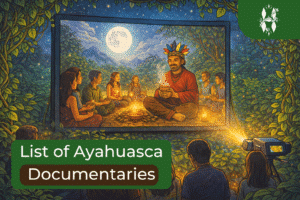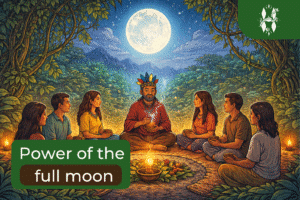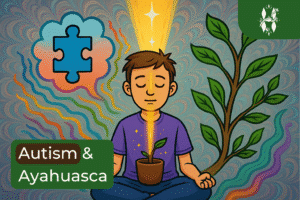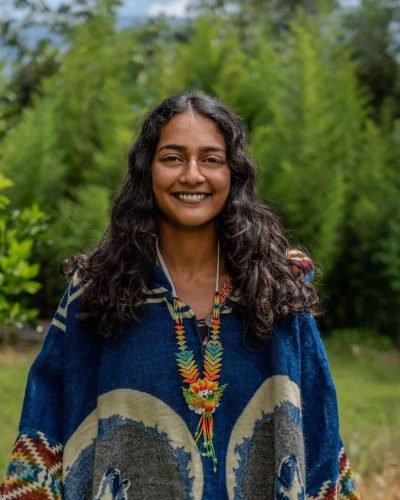Ayahuasca is really starting to make waves around the world. It’s fascinating to see how this ancient brew is sparking interest far beyond its roots, even here in the United States and over in Europe. More and more people now don’t have to journey far to experience its effects. This raises a pretty intriguing question: do you need to book a flight to Latin America to get the real deal, or can you find an experience just as meaningful closer to home? It’s about figuring out if the place where you have your Ayahuasca journey matters as much as the journey itself.
Key takeaways:
- It is important that you consider the legal status where you drink Ayahuasca
- The quality of the Ayahuasca facilitators is essential.
- There are benefits in the west (accessibility) and benefits in the native territories of Ayahuasca (quality of facilitators, closeness to nature, level of preparation, support for the indigenous communities etc.) Where to drink Ayahuasca is an individual decision and depends on various factors and is different for each individual and their situation
Table of Contents
Things to consider:
Legality:
When diving into the Ayahuasca journey, there are some practical things you’ve got to consider, with legality being a big one. Down in Latin America, Ayahuasca is not just legal; it’s a part of their deep-rooted indigenous practices. That’s not always the case in the West, but times are changing. In some places, like San Francisco, they’re starting to ease up on psychedelics, with Ayahuasca sometimes making the cut. And then there’s Portugal, where they’ve taken a unique approach by decriminalizing all substances.
In the USA, it’s interesting because Ayahuasca can be used legally within certain religious groups. But let’s be real, these situations are more the exception than the rule. In a lot of places, Ayahuasca is still off the table legally. That means those who run these sessions might be shouldering a lot of risk, much more than the participants.
And there’s something a bit off about settling into an Ayahuasca experience with the thought in the back of your mind that, technically, it’s not on the right side of the law. Worst case scenario, you’re in this vulnerable state, and the police could show up. Not exactly the setting for spiritual enlightenment, right?
We always suggest sticking to the straight and narrow, following what’s legal where you live. It’s about staying safe and making sure your experience is as stress-free as possible.
Quality of Ayahuasca facilitators:
When it comes to the quality of Ayahuasca facilitators, there’s a notable difference between those in its native lands and elsewhere. In places where Ayahuasca is deeply rooted into their cultur, the expertise and insight of shamans, or so called Taitas and Mamitas in Colombia, is unparalleled. They’ve often been immersed in the traditions from a young age, some even taking Ayahuasca since they were kids, long before they start to guide others. This depth of knowledge isn’t just learned; it’s lived, giving them an incredibly rich understanding of the plant’s nuances.
Now, you might get lucky and find some of these indigenous Taitas hosting ceremonies in the West. When you do, the authenticity and quality of your experience is likely to be just as profound as it would be in their homeland. That’s a gem of a find, and if you come across a setup like that, concerns about quality shouldn’t bother you.
On the flip side, you’ve got facilitators who may have fast-tracked their journey to becoming Ayahuasca guides. It’s a different vibe for sure, and it’s something to think about. The level of experience and the connection to Ayahuasca’s cultural roots can vary widely, which might influence the depth and safety of your experience. It’s something to approach with eyes wide open.
Must read Blog: What is Ayahuasca – the mystery of the Amazon explained
Rushing the process of sharing Ayahuasca
Imagine this scenario: Let’s I would be living in the West, deeply familiar with Ayahuasca’s profound journey after participating in over a hundred ceremonies and supporting countless others through their experiences. Given this, plus a growing demand for Ayahuasca ceremonies around me, it wouldn’t be surprising if I felt a pull to start sharing Ayahuasca with others. And let’s say I go for it – chances are, I might handle most of the ceremonies quite well, given my background.
But here’s the thing to chew on – there could be those tricky moments, those intense sessions where things get really challenging, and it’s possible to be overwhelmed. I might be doing it with the best intentions, feeling almost ready, yet there’s that niggling doubt: Am I rushing it? This isn’t about doubting my abilities, but it’s acknowledging the gravity of what it means to lead an Ayahuasca ceremony. It’s delicate work, loaded with responsibility. I have got to be certain, I can navigate whatever comes up, having been through it many times myself and guiding countless others.
Some might be nudged into leading ceremonies by the circumstances, maybe even a bit of financial incentive. I can see they might have the purest intentions, but the timing could still be off. It’s not for me to pass judgment – everyone’s path is their own, and I don’t know every facilitator’s story. I’m just pointing you to keep this in mind, to really consider the experience and background of whoever’s leading your Ayahuasca ceremony. It’s an important factor in setting the stage for a safe and meaningful experience.
Upholding traditions
Alright, let’s talk about upholding traditions. I remember a participant who attended our retreat recently. He was also part of a church back in the US where Ayahuasca was shared, and he pointed out just how different the two experiences were. He was struck by the deep respect we showed towards Ayahuasca, something he suggested was a standout compared to his other experiences. Now, I haven’t personally sat in a ceremony at that church, so I can’t speak from first-hand experience. But his words got me thinking about how the setting and approach can vastly alter one’s experience with Ayahuasca.
This isn’t about saying one way is better than the other, but it does shine a light on the diversity of practices surrounding Ayahuasca. The traditions and the reverence we have here are honed from generations of cultural practice, and they resonate deeply with many who come to seek Ayahuasca. It’s a reminder that while the essence of Ayahuasca remains the same, the vessel through which it is delivered—the ceremony and its caretakers—can color the experience in very unique ways. It’s worth pondering over when you consider where and with whom to embark on your Ayahuasca journey.
Must read Blog: Ayahuasca Cultural appropriation – the western influence and its impact on indigenous communities
Advantages of drinking Ayahuasca in the West
Sure thing, let’s unpack some of the positives of engaging with Ayahuasca in Western settings. The most obvious plus is how much more available it is. Take my own experience as an example – my first encounters with Ayahuasca happened in Europe. And I can’t express enough gratitude for those moments. They were the beginning of an incredible, transformative path for me.
I remember something the shaman told me during those early days. He said that the spirit of Ayahuasca has its own desire to reach out, to touch more lives beyond its traditional home. And honestly, that idea resonates with me. It feels like there’s a meaningful reason why Ayahuasca isn’t confined to the jungles like it was two decades ago, why it’s spreading its roots far and wide.
Today, it’s not just about people trekking to distant lands to seek this medicine; it’s also about Ayahuasca finding its way to them, wherever they might be. It’s as if Ayahuasca itself is seeking to meet those who are searching for its healing power, offering opportunities for growth and healing across the globe. This accessibility is one of the greatest advantages of the presence of Ayahuasca in the West, opening doors to those who might otherwise never have the chance to cross its path.
Advantages of drinking Ayahuasca in Latin America:
Quality of facilitators
Diving into the benefits of engaging with Ayahuasca in its native terriotry, there’s a lot to be said about the unparalleled caliber of the facilitators you’ll find there. As we touched on before, the expertise of shamans and Taitas in these regions is nothing short of extraordinary. Picture families who’ve been part of the Ayahuasca tradition for countless generations, holding an immensely deep connection with the medicine – it’s a kind of lineage that you simply can’t find elsewhere.
In these communities, the relationship with Ayahuasca is not just a practice; it’s a way of life. These facilitators carry with them an ancestral wisdom, a profound understanding of the intricate spiritual and healing aspects of Ayahuasca. This depth of knowledge and the natural environment of the nature come together to create a setting that’s steeped in tradition and authenticity.
Choosing to drink Ayahuasca here, you’re not just consuming a brew; you’re immersing yourself in an entire ecosystem of healing that has been cultivated over generations. The facilitators are custodians of a sacred trust, and their guidance often comes from a place that transcends mere knowledge – it’s an embodiment of their cultural heritage. It’s this deep-rooted level of experience with the plant that makes participating in ceremonies in these countries a truly unique and powerful encounter.
Closeness to the nature / their territory
When drinking Ayahuasca in Latin America, the Ayhahuasca does not have to travel through half the globe. It might not seam like that big of a deal but energetically there is a difference in it.
Also there is something special about drinking Ayahuasca in its native territory (especially in the amazon.) It is not really something you can put into words, you have to experience it yourself.
Level of preparation
Going on an Ayahuasca journey in its native territory isn’t just about the ceremony itself; it’s also about the journey you undertake to get there. Reflecting on my first retreat in the Colombian Amazon, the magic began well before the first cup of Ayahuasca. It started with a flight from Germany to Bogota and continued with a lengthy 16-hour bus ride to Mocoa. That extensive travel doesn’t just take you across the world—it takes you deeper into your own intentions and purposes.
The physical distance covered sets in motion a parallel internal journey. Questions start to surface: Why am I seeking this experience so far from home? What am I searching for within myself? What aspects of my life am I ready to transform? The anticipation and the shift begin to build with every mile traveled, initiating a process of self-inquiry and reflection.
While not every journey to an Ayahuasca retreat requires such an extensive trek, the act of stepping out of your everyday environment and investing significant effort to reach the destination amplifies the significance of the experience. There’s a psychological aspect at play—when we put considerable effort into our pursuits, we tend to value the outcomes more deeply. This investment of time and energy, the very act of seeking and reaching, it prepares and opens us up in ways that are subtle yet profound, laying fertile ground for the transformative work Ayahuasca can facilitate.
Must read Blog: How to prepare for Ayahuasca
Support of the indigenous communities:
Understanding the connection between Ayahuasca retreats and the indigenous communities is essential, as it touches on the roots of this sacred practice. When you participate in a retreat in Latin America, there’s a good chance that the center is working in direct collaboration with the local communities. These partnerships are often built on respect and reciprocity, ensuring that the benefits flow both ways.
Conversely, it’s possible for retreats in Western countries to be a few steps removed from this direct line of support. They might procure Ayahuasca through other means, perhaps even online, which can dilute the connection with the indigenous people who have been the stewards of this medicine for generations.
While this isn’t a blanket truth, and there are certainly exceptions, the trend tends to lean towards a higher level of engagement and support for indigenous communities in their native lands. By choosing a retreat in Latin America, you may be contributing more directly to the preservation of their traditions and providing economic support that helps sustain their way of life. It’s a consideration worth weighing, as it goes beyond personal healing to touch the lives of those who have been the custodians of Ayahuasca for centuries.
Conclusion
In concluding, it’s clear that Ayahuasca’s reach has extended far beyond its Amazonian cradle, touching lives across the globe. The essence of this journey is not just the destination, but also the sense of trust and safety you cultivate within yourself, with the spirit of Ayahuasca, and with those who guide you through its profound depths. Engaging in open dialogue with the facilitators, feeling a harmonious connection with them, is fundamental before going on such a significant experience.
The transformative power of Ayahuasca is not confined to a single place—it transcends geography. Whether you’re in its ancestral home or elsewhere, if the conditions are right, the potential for deep change is there. Yet, there’s an undeniable charm and perhaps an added dimension to partaking in the ceremony in the very environment where Ayahuasca has been revered and used for centuries.
Above all, it’s crucial to navigate this path with respect for the law. Understanding and adhering to the legal frameworks in place safeguards not only yourself but also the integrity of the Ayahuasca tradition. As we honor the legal boundaries, we also honor the sacredness of this ancient path of healing and discovery.
FAQ
How is Ayahuasca different in Latin America compared to the west?
Ayahuasca is different in Latin America because it does not need to be transported around the world. It is in its natural habitat and shared by people who are connected with this tradition for multiple generations. This makes it a special experience. However, Ayahuasca is expanding to the west and it is also possible to have transformational experiences outside of Latin America. (Please make sure you drink with people who are qualified to share Ayahuasca and a place where it is legal)
What is the problem with drinking Ayahuasca in the west?
There is no problem with drinking Ayahuasca in the west, just certain factors to be sure about. Primarily that the person sharing the Ayahuasca is indigenous following his traditions or a trained person who has studies for multiple years with indigenous masters. Of course also be aware of the legal situation wherever you are about to drink Ayahuasca.






